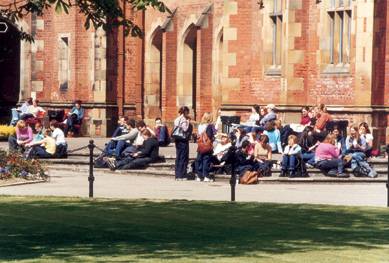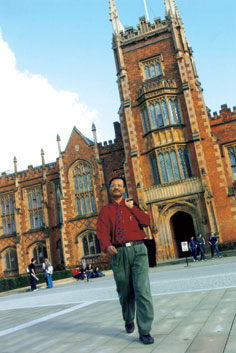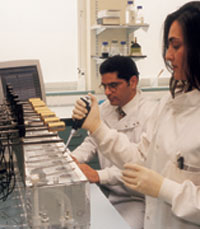| 2003 |

|
YEAR BOOK |
Queen's University Belfast
|
Fresh initiatives at Queen's
|

There have been successes across the entire spectrum of University life - in research, learning and teaching, enhancement of the 'Queen's experience' for students, and the contribution to the fabric of the community.
The 2002 Academic Plan provided for an �84 million investment across all five Faculties. The plan will see the appointment of 83 new academics and the creation of almost 90 postgraduate studentships.
University research has a tangible impact upon the quality of people's lives, and it is imperative that government funding in Northern Ireland keeps pace with the rest of these islands. Its curtailment would in due course be felt in the provision of healthcare, education, social and cultural facilities, and employment.
More than 30 successful high-technology Queen's spinout companies offer direct evidence of the intimate relationship between leading-edge research and commercial success. These have in turn acted as a magnet to inward investment by a number of multinationals, contributing to the formation of a modern knowledge-based economy and sustainable employment.
In an economy dominated by small and medium-sized enterprises, Northern Ireland's university research base is unparalleled in the private sector and represents the only point of entry to global developments in the high-technology sector.

Queen's psychiatrists have contributed to an international breakthrough in understanding the causes of schizophrenia.
The population at large will also benefit directly from research being carried out by the QUESTOR Centre and the School of Civil Engineering, who are working with a number of partners to find new solutions to cleaning up industrial brown field sites.
Meanwhile, a Queen's psychologist helped test the nation's brainpower as part of the BBC's 'Test the Nation' quiz. Dr Colin Cooper devised and verified the multiple-choice questions, which allowed viewers to investigate their mental agility and reasoning skills.
On a less serious note, Queen's School of Electrical and Electronic Engineering helped raise the current of excitement in the World Cup tournament in Japan and South Korea by fielding the Irish team in the Robotic World Cup. Staff and students spent many hours developing and practising strategies for the cube-shaped, computer-controlled robots - at the same time discovering a great deal about how robots tackle the many obstacles that arise in 'normal' environments.
One way in which Queen's research has affected most households in Northern Ireland is through the collection and cataloguing of unique townland names, dropped from the address system in the 1970s with the introduction of postcodes. An exhibition of the group's work was displayed to MLAs in Stormont.

A major new initiative provides students with essential job-related and learning skills. The new competencies are being introduced into degree programmes, and are aimed at enabling students to adapt to a society characterised by changing patterns of employment, the decline of traditional jobs, the growth of new technologies, and the need to develop a proactive approach to change. A group of key skills consultants has been appointed to advise and help colleagues in implementing the policy.
Many Queen's staff and students have links with schools. For example, under the Medics in Primary Schools initiative, sponsored by NIE, medical students talk to children in their classrooms about basic healthcare and their own experiences as a medical student. This is backed up by an event in the University which many of the children attend.
In a project involving the Graduate School of Education, and Stranmillis and St Mary's University Colleges, students from the two University Colleges teach science in primary schools alongside regular classroom teachers. In addition to giving the children a deeper understanding of science, the student teachers introduce the children to the possibility of studying the subject at a higher level and, possibly, following a scientific career.
In the Art@Queen's project, local artists visit schools and encourage children to express themselves visually. Some of this art has been on display in the university's art gallery.
The Naughton art gallery is a space where the University can display its own extensive collection in sympathetic surroundings. It is also an area where new work and new exhibitions can be shown in exciting ways. Once again, by encouraging public access, Queen's is showing its commitment to a university without walls.
Sponsorship of major competitions for new works offers further evidence of belief in the power of the arts to unite and inspire. One example is a new commission worth �20,000 to celebrate the past and future contributions of women at Queen's - a fruit of the highly successful Gender Initiative, which aims to enhance the role of women in the University. The winning work, by Newry-born artist Michelle Rogers, depicts a number of women striding forward into the light in a 15 foot by six foot painting which is displayed at the heart of the University - in the Council Chamber.
A further example is a competition organised by the School of Archaeology and Palaeoecology calling upon artists to develop new ways of revealing the past by producing images that capture both the mystery of what remains and the excitement of discovery and understanding.
The University's regular contributions to the community through the Belfast Festival at Queen's and the Queen's Film Theatre remain very considerable. For 40 years, the Festival has brought top-rate performers to one of these islands' most important displays of international culture, putting Belfast firmly on the global map as a city of culture.
In February 2002, the Prince of Wales officially opened the Great Hall in the Lanyon building, refurbished at a cost of �2.5 million. One of the most important architectural renovations carried out in Northern Ireland in recent years, the project was funded by the newly-formed Queen's University Foundation, which raised the money from private sources. The high quality of the restoration was recognised in an award by the Royal Institute of British Architects.
The �4.5 million Sonic Arts Research Centre, a world leader, was launched during the past year and is set to make a major contribution to the development of the creative economy in Northern Ireland. It is one of the four Queen's projects to receive funding under the Support Programme for University Research (SPUR) initiative announced in 2000 by former Higher Education Minister Dr Sean Farren. It brings together the expertise of three of the University's flagship departments - Music, Electrical and Electronic Engineering, and Computer Science - to develop a holistic approach to music creation and associated technologies.
The other three SPUR projects are also progressing. The Virtual Engineering Centre has been launched, and construction of a new building for the �9 million International Centre for Experimental Physics is well under way. The Institute of Governance, Public Policy and Social Research has recruited a number of highly qualified staff and looks forward to moving to new premises.
A �3.5 million purpose-built research centre which will underpin Northern Ireland's pharmaceutical development base opened last year. The McClay Research Centre for Pharmaceutical Sciences, located within the University's campus at Belfast City Hospital, is one of the first Queen's buildings to be wholly funded by a charitable donation.

A �2 million medical library opened on the Royal Victoria Hospital site which will serve not only University staff and students, but will also provide a service to health care professionals across Northern Ireland under an agreement between Queen's and the Department of Health, Social Services and Public Safety.
A new facility houses the Northern Ireland Centre for Postgraduate Pharmaceutical Education and Training, which has gained a national and international reputation for the quality of its courses in providing postgraduate training to practising pharmacists throughout Northern Ireland. The Centre is a leader in providing distance learning courses to health professionals.
A further service that will bring benefits beyond the University is a new centre that offers small businesses advice on best practice in business processes, as well as a range of technological solutions which might boost their performance. The Foresight Business Process Centre, based in the Northern Ireland Technology Centre, aims to provide small and medium-sized enterprises throughout the province, with guidance on affordable and appropriate Information and Communication Technology solutions.
An on-line translating and interpreting service, provided by Queen's Language Centre and used by some of the top businesses throughout Northern Ireland, won the Northern Ireland Languages Services Award under the Trade Partners UK's National Languages for Export Campaign. The Language Centre electronically transmits documents to qualified translators and forwards the returned translation to the customer.
Excellence in teaching is underpinned by excellence in research, and these two pillars will continue to be the mainstay of our activity in the years to come. Queen's students experience and benefit from the very best educational, social, sporting and cultural provision, while business and the wider community benefit from the highest quality research and development, and from the availability of intellectually able and highly skilled graduates.
Contact: Robert Baxter, Communications Office, Queen's University Belfast, Belfast BT7 1NN;
Tel: 028 9027 4329; E-mail: [email protected]